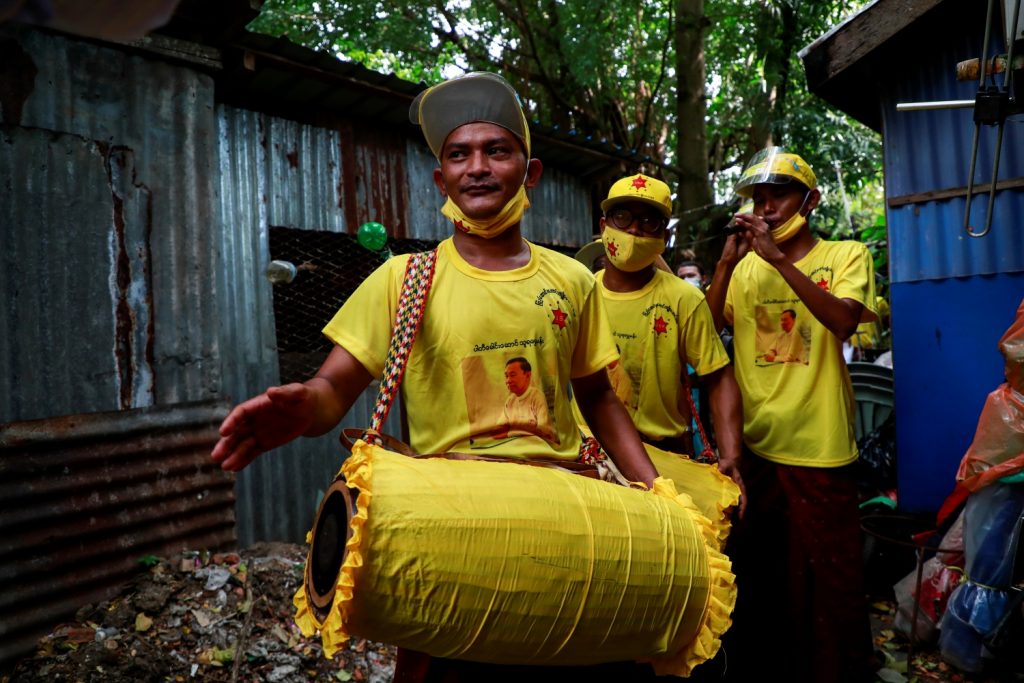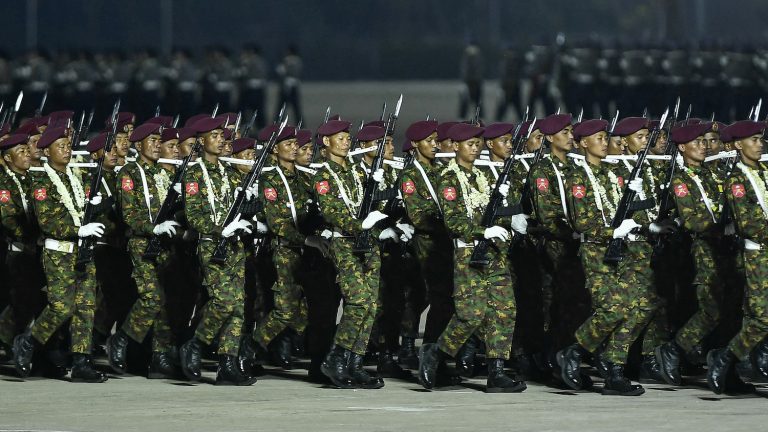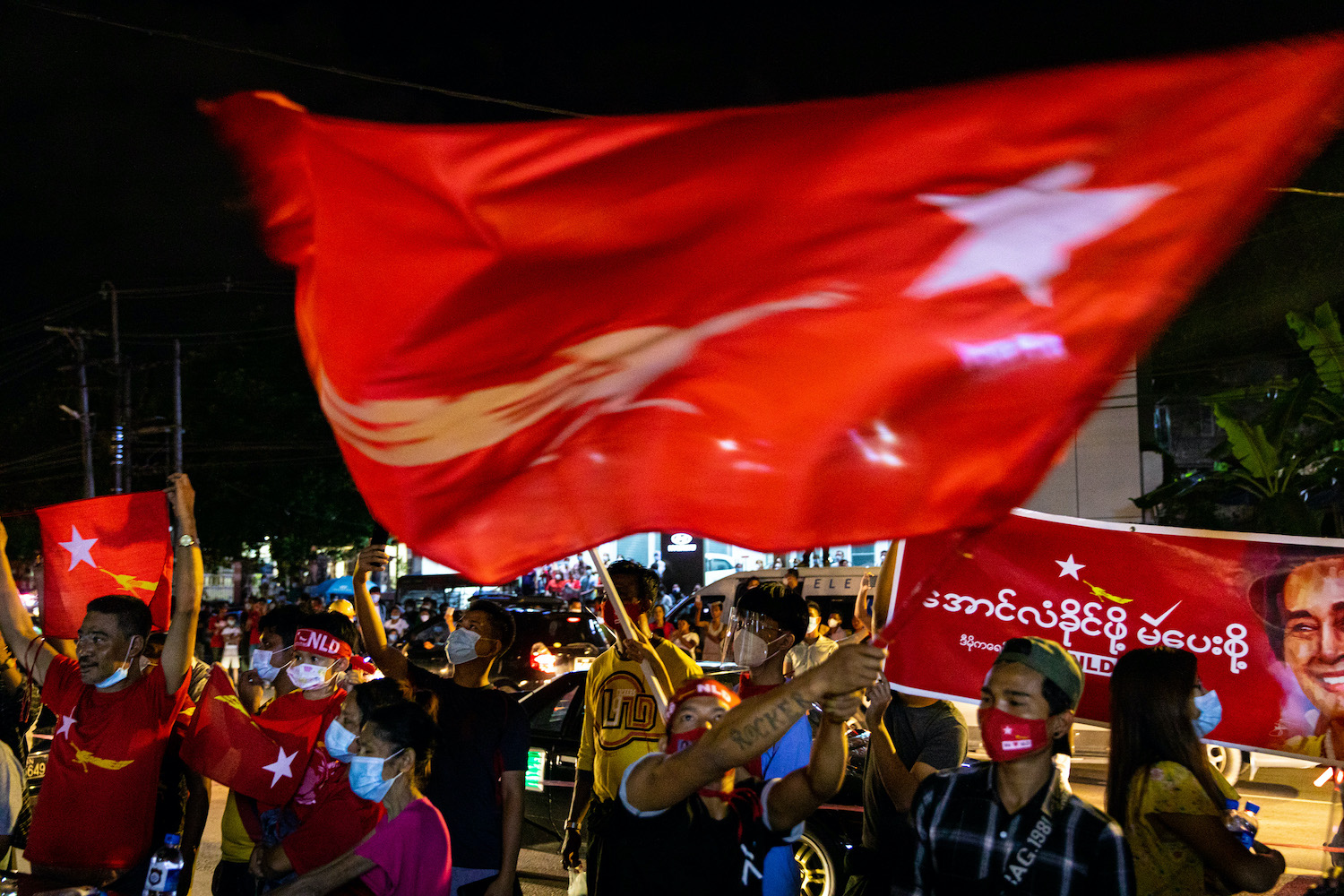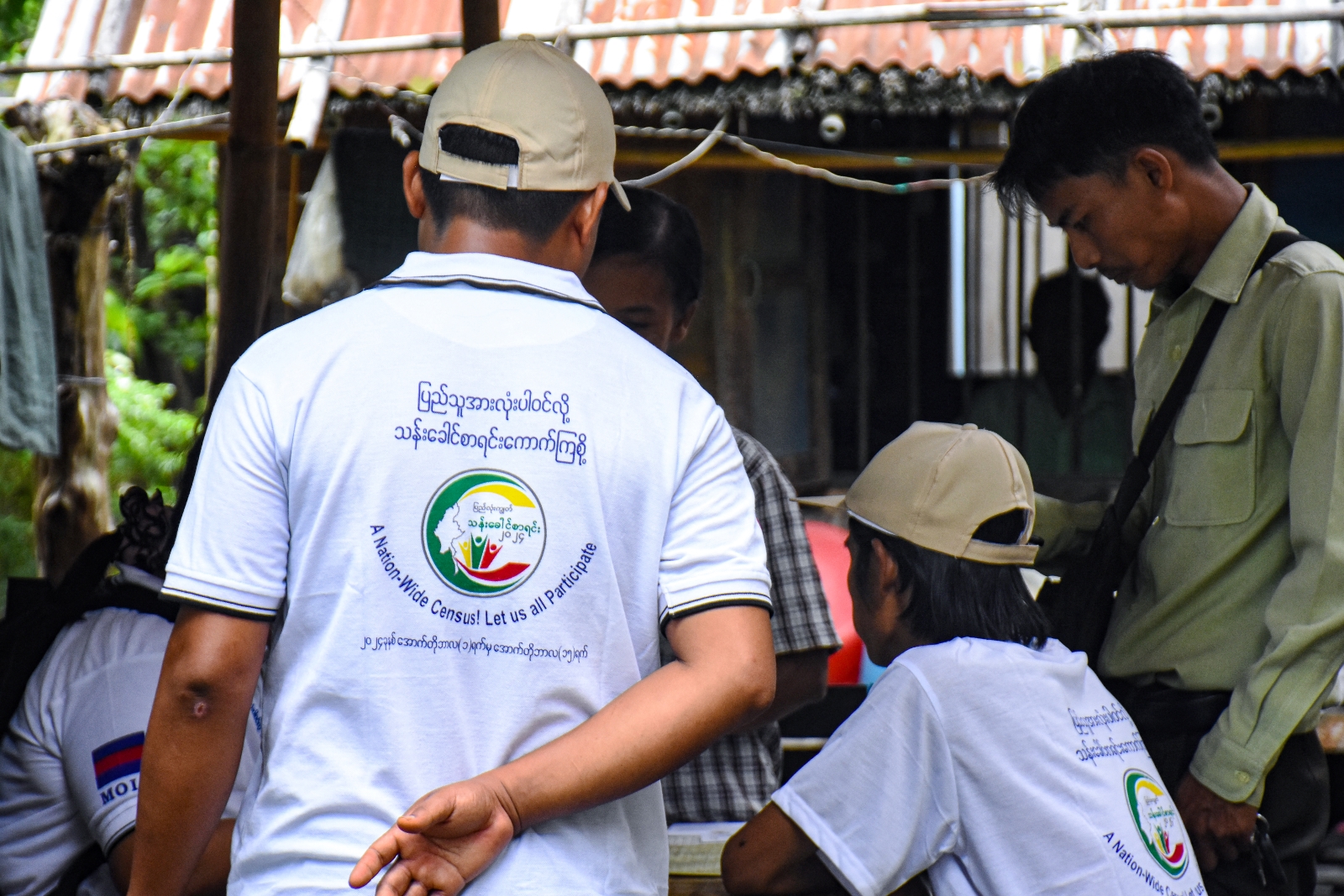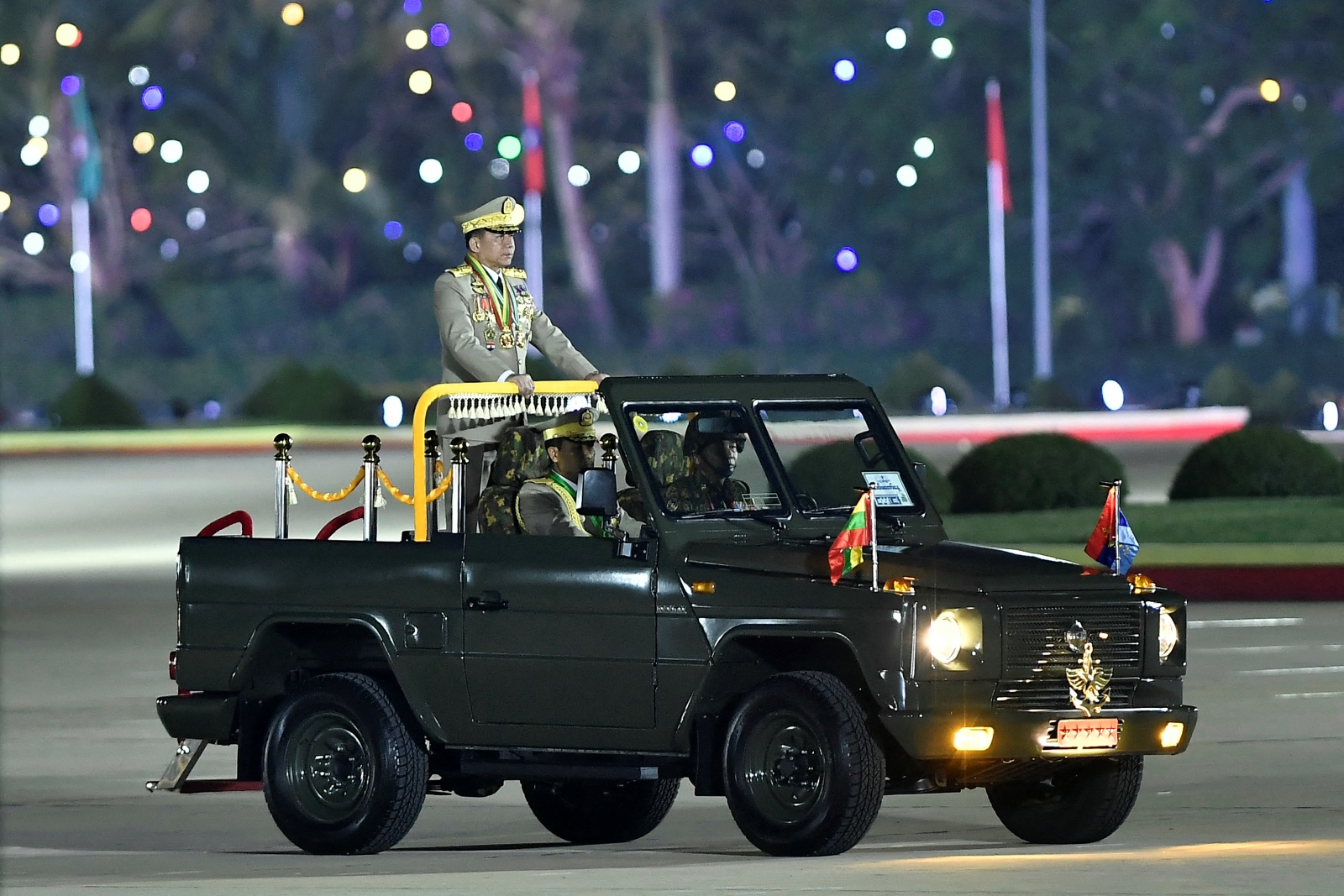U Shwe Mann’s party has grown rapidly thanks to the wealth and influence of its leaders, but their military backgrounds cast doubt on its claim to offer a middle way in politics.
By SWE LEI MON | FRONTIER
“I’m the one who made the most enemy corpses for the general. I got the first prize for four consecutive years.”
Former Tatmadaw colonel U Kyi Htut Win, the Union Betterment Party candidate for Nay Pyi Taw’s Dekkhinathiri Township, was recalling his time fighting under the command of party chairman U Shwe Mann. “He loves me and I trust him,” Kyi Htut Win said.
The Pyithu Hluttaw candidate commanded a battalion engaged in a bloody counter-insurgency campaign against the Karen National Union in 1994, when Shwe Mann was a tactical operations commander in Kayin State. Kyi Htut Win still calls Shwe Mann “general” and told Frontier in a September 16 interview that his relationship with the man who once ranked third in the military junta was “cemented on the front line”.
This may seem like an unusual bond in an age of civilian politics, but it is typical of the leadership of the UBP. Although the party is less than two years old, it is already one of Myanmar’s largest in terms of its membership and network of branches across the country, and in the number of candidates it is fielding for the November 8 general election. Yet, despite its ambitions, Frontier interviews with senior leaders have revealed a party that at its core is a tight network of former army officers who have remained loyal to Shwe Mann throughout his military and political career (recounted in this Frontier article from March).
While this composition has brought financial heft to the party, as well as a store of leadership experience that most parties lack, it could also undermine the UBP’s attempt to position itself as a middle way between the ruling National League for Democracy, with its roots in the democracy movement, and the former ruling Union Solidarity and Development Party, with its roots in the Tatmadaw. It also suggests that, in a political culture defined by personalised leadership, the UBP ultimately represents more of the same.
Despite this baggage, Shwe Mann has made bullish statements about his party’s prospects in the coming election. The 73-year-old UBP chair, who at one time was Tatmadaw joint chief-of-staff under dictator Senior General Than Shwe, and at another an ally of NLD chief Daw Aung San Suu Kyi while speaker of the Pyithu Hluttaw under President U Thein Sein, has repeatedly said his party will win between 40 percent and 50pc of all seats.
In terms of candidates, the UBP’s 927 election hopefuls standing in 261 townships make it the fourth biggest party in the November vote, after the NLD, USDP and United Democratic Party. The UBP has said it will not contest seats in areas affected by civil conflict in Rakhine, Kachin, Chin and Shan states. The only Rakhine township it is contesting is Gwa, in stark contrast to the NLD, which is contesting all Rakhine seats.
The party’s logo – a red six-pointed star on a yellow background that bears a striking resemblance to the label of Thai energy drink M-150 – is now a familiar sight on branch offices and signboards throughout the country. However, on a trip to the southern Mandalay Region townships of Pyawbwe, Yamethin and Meiktila in September, Frontier found that most villagers were only dimly aware of the UBP despite Shwe Mann’s fame.
“Which party? Thura U Shwe Mann’s party? I haven’t heard much about it,” said Ma Thin Thin Khaing, a resident of Thee Gone village in Pyawbwe.
She was using Shwe Mann’s formal title of “Thura”, denoting bravery, which he received for leading army campaigns against the KNU in the late 1980s.
There were similar replies from the residents of Kyu Taw Wa, Min Lann and Kyi Ne villages in the same township.
In Ayeyarwady Region, Ko Htin Aung, who owns a gold shop in Sagagyi village tract of Danubyu Township, said there was no UBP office in the village tract and he knew none of the party’s candidates, even though they are running in all of Danubyu’s constituencies. “Most of the people don’t know about that party; the people are only aware of the two biggest parties,” he told Frontier, referring to the NLD and USDP.
The UBP’s chair in Yangon Region, U Tin Maung Oo, a former Tatmadaw colonel, acknowledged that having only a short time to prepare for the election had often made it hard to recruit candidates with a high stature in their communities.
“The timeframe is very short for us and we had to find leaders to form the party, so not all of them are qualified people” he told Frontier in a September 15 interview. “It was the same situation with candidates. However, we are confident about the election because we chose educated people as candidates.”
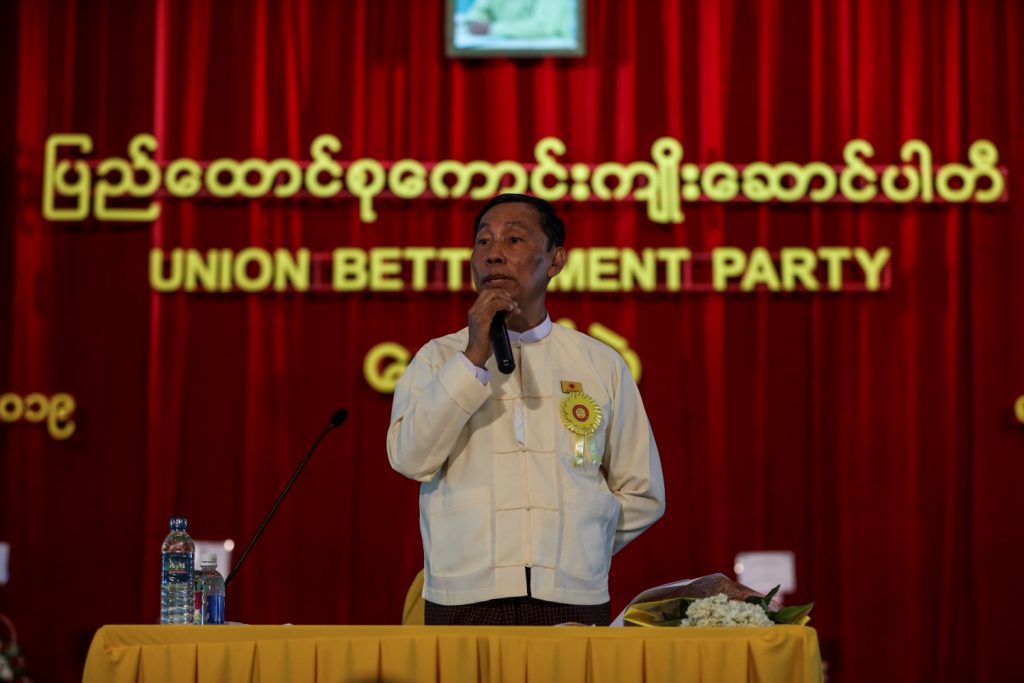
U Shwe Mann addresses a meeting of the Union Betterment Party in Yangon on June 29, 2019. (Thuya Zaw | Frontier)
Who’s who in the UBP?
A former central committee member of the USDP, Tin Maung Oo was removed from the party when it was purged of party chair Shwe Mann and his supporters in August 2015. The purge followed heightened tensions between Shwe Mann, the then speaker of the Pyidaungsu Hluttaw, and President Thein Sein.
Tin Maung Oo, who was elected to the Pyithu Hluttaw in 2010 as the USDP’s candidate in Shwepyithar Township, an industrial northern suburb of Yangon, is the UBP’s candidate for Shwepyithar-1 in the regional assembly.
In February 2016, weeks before the NLD government took office, Shwe Mann was appointed to head the Commission for the Assessment of Legal Affairs and Special Issues, which he had originally established in 2011 on becoming the Pyithu Hluttaw speaker. The commission was separate to the hluttaw but reported to Shwe Mann, who handpicked its members. These included his son, internet tycoon U Toe Naing Mann, alongside MPs, retired civil servants, soldiers and businesspeople.
Shwe Mann decided to form the UBP because the government ignored the laws drafted by the commission as well as its special legislative and policy advice, said Tin Maung Oo, who was a former commission member.
“The commission drafted 48 new laws and examined more than 2,400 special issues over three years and we were upset because the government did not implement our work,” he said, adding that Shwe Mann believed the situation showed the country needed a new national party.
Soon after Shwe Mann announced plans to form the UBP in early 2019, the NLD-dominated hluttaw voted to abolish the commission, three years after he was appointed its chair. This was thought to mark a parting of ways between Shwe Mann and Aung San Suu Kyi, who had formed an unlikely political alliance under the USDP government. This included Shwe Mann supporting NLD-drafted constitutional amendments as parliamentary speaker in June 2015, which brought his feud with Thein Sein to a head. Shwe Mann told Frontier after the commission’s dissolution that his party would not be seeking an alliance with the NLD.
On April 25, 2019, Shwe Mann and the UBP’s 18 other founders registered the party with the Union Election Commission. In an interview with Myanmar Times the previous January, UBP central executive committee member U Win Oo said of the founders that seven were former high-ranking Tatmadaw officers and 12 were civilians. Four of the former Tatmadaw officers and ten of the civilians were former USDP members, Win Oo said.
U Tun Kyi, 52, a steering committee member of the Former Political Prisoners Society, told Frontier that the UBP was essentially “born of the Tatmadaw” because many of its founding members are retired senior military officers.
Daw Su Su Hlaing, vice chair of the UBP’s Yangon Region office, believes the accumulation of leadership experience among senior members will give her party an edge with voters. “Our leaders have the ability to lead the government, and we have drafted plans for all sectors, including education, revenue, the economy, and others. All are ready to be implemented,” Su Su Hlaing, 49, who also serves as the party’s spokesperson, told Frontier on September 15 at the party’s central information office in Yangon.
A businessperson who owns a security company and a traditional medicine business, Su Su Hlaing has no political experience and is not a candidate in November’s election. She became familiar with Shwe Mann through the special commission, which consulted her at one point as a business expert.
Under Shwe Mann in the party hierarchy is vice chair U Phone Swe, general secretary U Ko Ko Naing and joint secretary U San Shwe Aung.
The 66-year-old Phone Swe is a former brigadier-general who served in the Tatmadaw for more than 30 years. He was also deputy minister for home affairs under the State Peace and Development Council military junta, and in this capacity was subjected to European Union sanctions along with his wife. He later served as deputy minister for social welfare, relief and resettlement in the post-2011 USDP government. In 2010 he was elected to the Pyithu Hluttaw to represent Kachin State’s Mogaung Township for the USDP.
Ko Ko Naing, a former senior member of the USDP, was also a brigadier-general in the Tatmadaw. He was appointed head of the Defence Services Medical Academy in 2010 and served as the Western Commander when the USDP government declared a state of emergency in Rakhine State in 2012 in response to an eruption of communal violence.
In November 2016, Ko Ko Naing was one of two USDP candidates in Mandalay Region’s Yamethin Township whose victories in the election a year before were annulled when the UEC upheld complaints by NLD candidates that they had invoked religion while campaigning. Ko Ko Naing had won the Pyithu Hluttaw seat and U Kyaw Myint had taken the Yamethin-2 in the regional assembly. Their seats were awarded to the NLD candidates, who were the runners-up in each race.
Phone Swe and Ko Ko Naing left the USDP along with 15 other Shwe Mann allies in 2016, after it became clear that Shwe Mann had no future in the party.
UBP joint secretary San Shwe Aung, a founder of the party and a former Tatmadaw colonel, served the government in a range of roles between 1984 and 2015. He was deputy director, director general and permanent secretary in various ministries, including Defence, Border Affairs, Hotels and Tourism, Transportation and Communications.
Tin Maung Oo says many retired military officers joined the UBP because of their respect for Shwe Mann as a veteran soldier.
Tun Kyi from the Former Political Prisoners Society said they deserved praise for seeking power through the ballot box and not the barrel of a gun, despite the harm they had collectively inflicted on former political prisoners like himself.
“Until recently, the military has sought to expand its power in Myanmar. So, no matter what others may say, I welcome the entry of every general who has left that idea behind and entered politics through an election,” said the former student union leader, who spent 10 years behind bars – including in the infamous Myingyan Prison in Mandalay Region, described as a “human hell” – for his involvement in the struggle against military rule.
Affiliation with the Tatmadaw is a liability for the USDP. The party’s humiliating loss to the NLD in 2015 was largely attributed to voters’ desire to escape the legacy of decades of military dictatorship. Given the USDP’s problems, the background of the UBP’s top leaders could also be a handicap. However, UBP spokesperson Su Su Hlaing said it was an advantage for the party to have former military officers as its leaders because of the experience they had gained serving such a disciplined institution.
“I think people should change their opinion about the military,” she said. “We need to differentiate between an organisation and a system [of government]. The reputation of the organisation was ruined by the system. There are good people in the military, as well as bad people.”
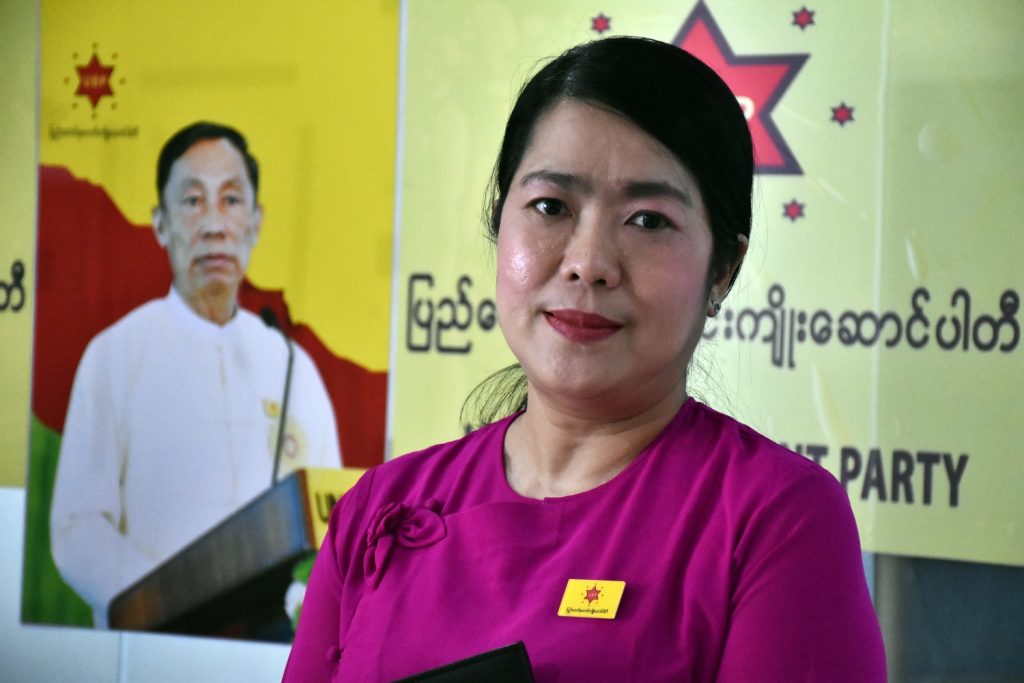
Following the money
One year and seven months after Shwe Mann announced the formation of the UBP, it has opened 261 township offices and more than 10,000 ward and village tract offices, and says it has more than one million members.
The dramatic rollout of party infrastructure since February 2019 has raised eyebrows, given the obvious expense involved. However, political analyst and author U Than Soe Naing said such an achievement would not be difficult for an elite group headed by a senior member of the former junta.
“He has been involved in the top levels of power in the country for [more than] two decades. He was a senior leader in the Tatmadaw and a chair of the USDP, the most powerful party in the past, and he has close connections to tycoons,” said Than Soe Naing, who is a former member of the defunct Communist Party of Burma. “I do not think it is difficult for such a person to form a big party, due to his property and his contacts.”
It has long been suggested that the business activities of Shwe Mann’s two sons benefited from their father’s position as third-ranked member of the junta.
Shwe Mann’s older son, U Aung Thet Mann, 43, heads the diversified Ayer Shwe Wah group of companies, and his younger son, Toe Naing Mann, 42, is married to a daughter of prominent tycoon U Khin Shwe, owner of the Zaykabar group of companies.
Ayer Shwe Wah says on its website it was formed in 1998 and is involved in agriculture, food processing, construction and engineering, logistics and transportation, hotels and tourism, refining oil and distributing and selling liquid petroleum gas, pharmaceuticals, healthcare services, and power generation and distribution. The group also has a mining company that was registered with the Directorate of Investment and Company Administration in 2009 under the name of Daw Khin Hnin Thandar, Aung Thet Mann’s wife.
Toe Naing Man is mostly known as an internet tycoon and the co-owner of defunct Red Link Communications, one of the early providers of broadband in Myanmar. He is currently listed as director of Myanmar Album Media Services on the company registry.
Despite the fortunes held by Shwe Mann’s sons, UBP spokesperson Su Su Hlaing said, “As far as I know, there is no link and no relationship between the party and the businesses run by the chairman’s sons.”
She added that the UBP was initially funded by Shwe Mann from the proceeds of property that he sold along with some of his wife’s jewellery, and had later received donations from people who believed that the party would perform well at the ballot box.
UBP Yangon Region chair Tin Maung Oo said the UBP was the first party in Myanmar to be formed by a single leader with his own money, and that this showed Shwe Mann’s commitment to serving the public. “I don’t know how much he got from selling his two plots of land,” Tin Maung Oo said, without saying where this land was. “He invested that money in the party; it was not easy for him.”
Tin Maung Oo said donations had been hit by the economic fallout from the COVID-19 pandemic. “The donors who used to give 100 lakh or 200 lakh [K10 million or K20 million] cannot afford to donate anymore because of the pandemic,” he said.
Nonetheless, Frontier estimates that the UBP has already spent more than K2 billion on its campaign.
Tin Maung Oo told Frontier that party headquarters had been providing K300,000 a month to each township office for basic expenses since the party was formed, and increased the amount to K500,000 in September.
The party was also allocating K1 million to each township to erect billboards and contributing K1 million to each candidate for their campaign fund. This is a great help in a context where candidates for most other parties, including the NLD, are expected to fund their own campaigns with minimal if any party assistance.
Tin Maung Oo insisted the party’s rapid expansion was not down to money alone, and that the UBP had also been warmly received by communities. He said people across the country who love Shwe Mann had invited the party to open offices in their townships. Most of the offices were in party member’s houses, he said.
However, Frontier found that the UBP is paying some people to erect signboards on their properties. Daw Mar Lu, a Kayan who lives at Taungpaing Susee village in Kayah State’s Shadaw Township, said she was paid K60,000 by the UBP to erect a party signboard in her compound. “They said K30,000 was for accepting the signboard and the rest was for my baby,” she told Frontier in early August.
Su Su Hlaing said the money did not come from party headquarters, but from the party chair in Kayah, who wanted to help poor residents of the state.
The spokesperson said she had spent tens of millions of kyat of her own money to help residents of the 14 townships in which she has the responsibility of securing UBP victories. “We are donating our own money and we are solving the problems in our areas in our own way,” she said.
Tin Maung Oo, who owns the Sane Lae Wai hospital in Yangon’s Shwepyithar Township and hotels in Nay Pyi Taw, Kalaw and Heho, said he was covering many of the costs of running the Yangon office with his own money because he did not want to make demands on headquarters.
“I am not a crony,” he said with a big laugh, “but I fulfil our needs as much as I can. Our party is not spending money like it’s water.”
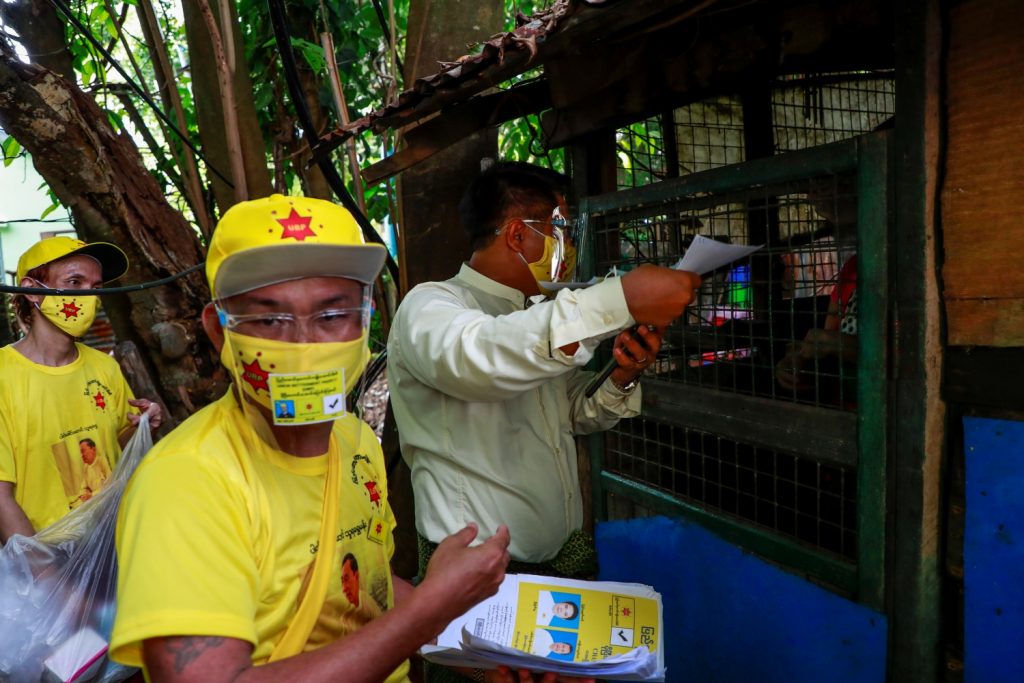
A transient force?
Political analyst Than Soe Naing says the UBP’s membership and financial power might enable some of its candidates to win seats on November 8, but the party will at best be a small, transient force in Myanmar politics.
“There is no hope for it to win many seats, because its leader was rejected by his constituents in 2015,” he said, referring to Shwe Mann’s defeat as a USDP candidate by his NLD rival in the contest for the Pyithu Hluttaw seat of Phyu, his hometown in Bago Region.
In addition to Shwe Mann’s toxic background in the junta, Tun Kyi of the Former Political Prisoners Society said the UBP and its policies were also unknown at the grassroots because the party was too young.
Su Su Hlaing agreed the party’s youth was a challenge and said she would have no regrets even if it were to perform poorly in November, because politics was for the long term. “We will compete as best we can, and we will gain experience from campaigning,” she said. “Our leader founded the party to become the most powerful political force in the future.”
Tin Maung Oo said the party was training young people as part of a strategy aimed at future elections. “The country needs a strong, long-term party because there are not enough strong parties in Myanmar,” he said.
However, veteran political activist Ko Mya Aye, a member of the 88 Generation Peace and Open Society movement, said new parties such as the UBP lacked a coherent message to voters. “They are all talking about democracy, but they are unable to explain to the people what kind of democracy they want and how to achieve democratisation,” he told Frontier.
The emergence of many parties is common in countries with a young democracy and they will likely disappear after Myanmar becomes a mature democracy, Than Soe Naing said.
The UBP will gradually fade away, he believes, despite the party’s ambitious long-term goals. “Only strong parties will be able to survive in the long term. We have seen that many parties have either disbanded or collaborated with powerful parties in the past. Such political forces will gradually diminish after a number of elections.”


